Humanity has long wondered if there is life after death. Mythology and religious texts speak of places like Paradise, the Elysian Fields, Valhalla, and Mictlan, and people have imagined the afterlife to be anything from never-ending feasts and casual walks in the countryside to repetitive torments corresponding to one’s greatest sins.
But some people have imagined a less ethereal-looking afterlife: instead of finding eternal rest (or damnation), deceased souls find themselves put to work in offices, sometimes administering the dead or other critical afterlife functions. We’ve seen this phenomenon in movies and television shows from Beetlejuice to The Good Place. Fantasy and science fiction writers are bringing out their own visions of the afterlife and working, after one has taken their last labored breath on Earth.
Here are eight fantasy stories about work after death.
Layoverland by Gabby Noone
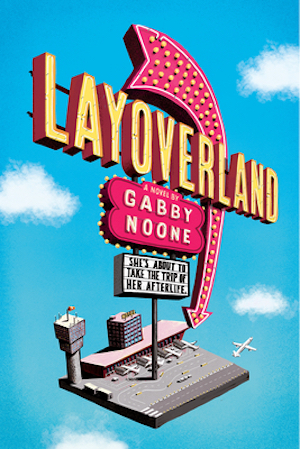
The only thing worse than ruining your best friend and sister’s life is dying just after it. Beatrice Fox wakes up to find herself on a plane, but the last thing she remembers is seeing an SUV heading in her direction. She has no idea how she got on the plane nor where the plane is going—but when she lands she soon finds out that this is Purgatory, and she has been assigned to work in the Memory Experience team. Her job? She has to help 5,000 souls figure out what is holding them back from passing into the full afterlife. Basically she conducts therapy sessions with folks. If she succeeds, she can take a flight to Paradise, but if she doesn’t…
Purgatory is exactly everything that it is cracked up to be—for example, all the food is encased in gelatin. But her first assignment is to help the boy who accidentally sent her to Purgatory. Can she get over her own feelings about her untimely death and help Caleb? The premise is really delightful; many books focus on Hell but I love the idea that Purgatory means being stuck in an airport and the surrounding areas.
The Library of the Unwritten by A.J. Hackwith
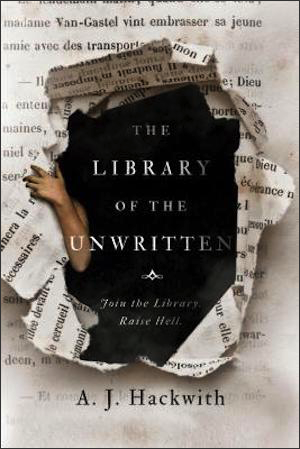
Jorge Luis Borges once said, “I have always imagined that Paradise will be a kind of library,” but that library doesn’t have to be in paradise. Claire Juniper Hadley is the Head Librarian of the Unwritten Wing, housed in Hell, where all the stories not told are housed. Her job, beyond the normal librarian activities, is making sure none of the books (or their characters) escape from the library confines.
But when a Hero escapes to find his author on Earth, Claire teams up with her assistant Brevity and a demon messenger to bring him back. But retrieval isn’t so easy—the fallen angel Ramiel attacks them, convinced they have the Devil’s Bible, which could destroy the current balance between Hell, Heaven, and Earth. Claire and her unlikely team have to travel through various afterlives to find the renegade unfinished character, while avoiding both Heaven and Hell. I particularly appreciate how the book doesn’t focus on souls crossing over (which many of the books do on this list). As a mega book lover, I loved the premise of a place where all the books that were never finished live for eternity.
The Seven Moons of Maali Almeida by Shehan Karunatilaka
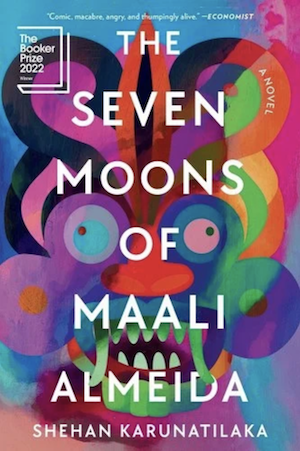
It’s 1990 in Colombo, Sri Lanka. Journalist and photographer Maali Almeida opens his eyes and finds himself in an office—akin to a customer service desk or post office, the office delivers news to the newly deceased that they have died. Maali is informed he now has seven moons to make his peace with the world. If he fails to cross over in this period of time, he will remain on earth forever. To aid in the process, he’s assigned a sort of afterlife counselor, but he decides to eschew her advice because he has no idea why or how he died.
He goes on a quest to find out what happened to him, allying himself with questionable characters including demons and ghouls as well as meeting people he’d photographed after they died. Unsure who to trust and learning the rules of this In-Between Place, he decides he must direct his boyfriend and his sister to find the photographic negatives that he took and hide that will shine a light on the horrors of the Sri Lankan Civil War. It’s so important that he risks eternity and damnation to do it. This at times ultra-violent book takes the reader on a wild ride filled with garbage men who chop up bodies with cleavers, conmen torturers, not to mention actual ghouls, demons and lost souls. .
This might be the heaviest read on this list since it deals with the atrocities of the Sri Lankan Civil War, police violence and torture, homophobia, self-loathing, and more. But I find the concept of different kinds of souls (ghosts, ghouls, demons, etc.) as well as the sense of sheer rage throughout the book so compelling. It’s not the easiest read but a worthwhile one. There’s a reason why it won the 2022 Booker Prize.
Daisy Cooper’s Rules For Living by Tamsin Keily
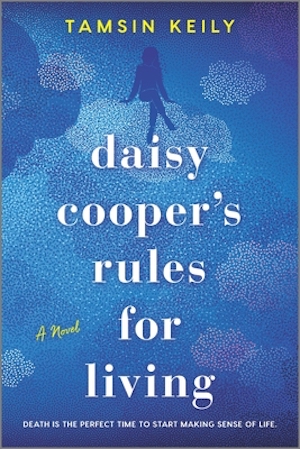
No one wants to die, but especially not before their time, and definitely not because of a clerical error. Daisy Cooper dies by slipping on ice, but soon finds out that it’s fifty years before she was meant to die and that means she can’t move beyond. Since she has nothing else to do for fifty years, and Death (or Scout) needs the help, she becomes Death’s Assistant, accompanying the newly deceased to Death’s office. Daisy realizes Death isn’t so bad (though she definitely helps him in the compassion department), plus the job allows her to check in on her family to see how they are handling her demise. But soon there’s a chance she could go back to her old life, and she must decide if she will take it or stay Death’s assistant until she can finally move on.
Daisy died fifty years before her time and it messes up the order of things, but allows for the examination of grief through Daisy and the people she checks in on. Plus I’m always fond of books told from different points of view.
The Ferryman Institute by Colin Gigl
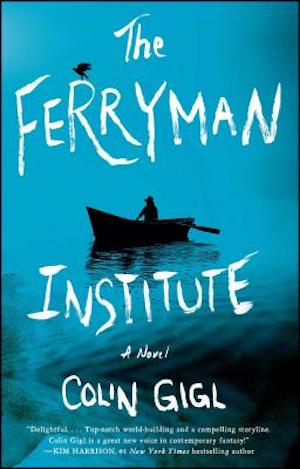
Charlie Dawson’s job is to save the dead. As a Ferryman, he convinces the newly deceased to make their final peace and move on. The Ferryman Institute recruits from humans as they are dying, which is how Dawson ended up in his role in the first place. His manager gives him his assignments (newly departed souls), then Dawson gets a special key to take him directly to the newly deceased. He has a 100% track record of convincing people to move on, but he’s exhausted and wants out. After 250 years, he’s not satisfied with his job and has requested leave thousands of times, but he’s too valuable a resource for the Ferryman Institute to give him a break.
Things seem to just go on indefinitely. But one day, his assignment is to help a victim of suicide named Alice to the Afterlife, and he gets the unusual opportunity to help her remain alive instead. He gets a note from the president of the Institute: “Be a Ferryman or save the girl. Your choice.” But his decision gets him in the hot seat with the Institute’s Internal Affairs—Inspector Javrouche didn’t like him in the first place, and now has the opportunity to take Dawson down. Can Dawson protect Alice, and also himself? Or will the Inspector catch up to them?
There’s nothing like a story about second chances.
Hell’s Detective by Michael Logan
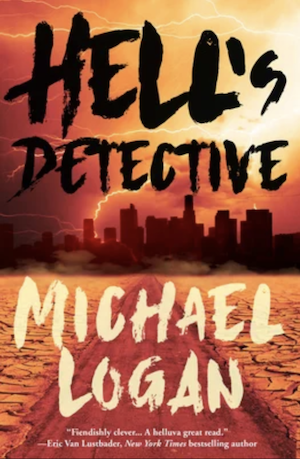
Kat Murphy would do anything to stop reliving her biggest mistake: intentionally killing her lover and herself. But that’s her fate in Lost Angeles, Hell, whereas the creature called the Torment makes her remember her worst moment every night. In Hell, you can just keep on sinning, so the afterlife just gets worse and worse for the people there. Thankfully, Murphy was a detective during her life, so she can continue working in that role in death. When she gets the opportunity from the Chief Administrator of the City to find a mysterious lost box in exchange for calling the Torment off, she takes it. As she travels to the darkest parts of Lost Angeles, she soon realizes whoever holds the box has immense power over the world. Does she finish the job or does she make sure the box does not fall into terrible hands?
I loved the idea of a hardboiled detective novel taking place in Hell with a female lead, plus it’s neat to think of Hell as a broken mirror of Earth, where you can keep sinning but you get tormented with your worst deeds on a nightly basis. That seems quite tortuous in itself!
Graveyard Shift by Angela Roquet
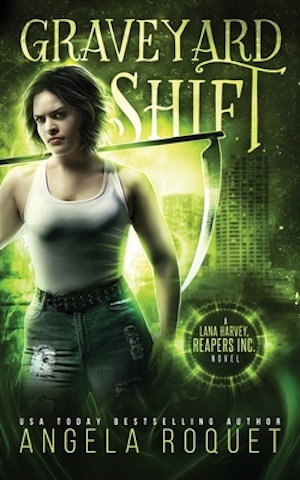
For many, a job is a passion; for others, it’s a thing to pay the bills. Reaper Lana Harvey is in the latter category. She’ll do the bare minimum to keep her job but that’s about it. She reaps souls from the newly dead and travels on her ship that she co-owns with her friend and fellow reaper, Josie, to the soul’s appropriate realms (depending on their belief system). But it’s low pay and she hates her boss and does what she can to needle him—even if he is the Grim Reaper himself. When she’s not reaping souls, she’s hanging out at the Purgatory Lounge, a bar run by a demon, or going shopping.
So it’s a bit of a surprise when she gets a promotion, having done pretty much nothing to deserve it. She’s tasked to find a particular soul to reap, but it turns out that she now has a target on her back. Control this soul, control the world.
So many characters on this list are pretty competent or excellent at their jobs, but what about a reluctant, maybe even lazy reaper? Harvey gives a fun perspective of a person who just wants to party instead of doing work, even if it is in the Afterlife. Graveyard Shift is the first book of seven.
The Devil’s Detective by Simon Kurt Unsworth
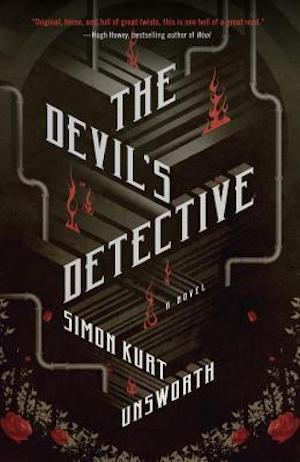
In Hell, Thomas Fool is an Information Man, having been plucked out of Limbo and assigned an impossible role. He’s an investigator in Hell; most of his time is spent stamping paperwork “Do Not Investigate” because what’s the point? It’s Hell afterall; death and brutality are part and parcel. Demons kill humans with impunity. But when Fool’s tasked to accompany a Heavenly diplomatic trip and a human is horribly murdered, he’s assigned the task to uncover the murderer. His superiors want it cleared up as quickly as possible, but how does one bring a demon to justice? It’s the first of two books in the Thomas Fool series.
This is a story of an investigator given the seemingly pointless task of investigating murders in a place where it is normal and there’s really no punishment. The world building is thoughtful but very dark.
Elisa Shoenberger (she/her) is a freelance writer and journalist in Chicago. She also has written for the Boston Globe, Huffington Post, WIRED Magazine, Slate, and others. She writes regularly for Book Riot, Library Journal, and Murder & Mayhem. She’s obsessed with dogsledding, murder mysteries and cheese. Twitter: @vogontroubadour and at Mischief and Writing.











Those are all new to me. Thank you.
In other words, eternal damnation.
Jim Butcher’s Ghost Story should fit into this genre as well.
Tad Williams’s Bobby Dollar books have mortals undertaking various jobs in the afterlife.
Very interesting topic

In Parke Godwin’s Waiting for the Galactic Bus, one of the leads winds up as a ~clerk in a brothel. What she doesn’t know is that Topside and Below Stairs (which she thinks of as Heaven and Hell) are run by a pair of energy-based aliens who were left behind on a class trip and uplifted proto-hominids to avoid being bored; most “souls” fall into something like their old work (Edmund Kean and John Wilkes Booth are still hams…). The sequel, The Snake Oil Wars, features a lawyer (you can figure out who it is) arguing his greatest case.
Richard Kadrey’s Sandman Slim did a lot of work for Hell, and then ‘retired’ back to Earth.
The protagonist in Greg van Eekhout’s Norse Code has the protagonist assigned to be a Valkyrie.
@2 – “The Bureau of Lost Souls”; the title story of an early collection by Christopher Fowler (who himself sadly departed just a couple of months ago), has a similar premise.
This series would fit as well and was absolutely entertaining!
Christopher Moore’s novel “A Dirty Job”.
Detective Inspector Chen (from the series by Liz Williams) has to pop in and out of the afterworlds in the course of his investigations, with a demonic counterpart that he works with on some cases. And he’s also married to a demon from Hell.
The Unsworth book sounds like a spiritual cousin to the late Philip Kerr’s ‘Bernie Gunther’ series, set (at least at first) in the nascent Hell-on-Earth of late-’30s Germany. In particular, there is the problem of investigating a murder while being on the look-out for signs that this was someone who was supposed to be murdered….
“On the Gate” by Rudyard Kipling
I’ve read two in this category, Midnight Library, which I liked after I got through the super depressing beginning; and Under the Whispering Door, which I thought spent too much time explaining the rules of the afterlife.
Cool. Let me mention a neat movie, “RIPD”, where the guy dies and gets drafted into a police force for the dead.
I wonder – would Heinlein’s, “Job: A Comedy of Justice” fit? The protagonist DOES wind up in Heaven, but he doesn’t care for it much, and his “girl friend” doesn’t make it there.
Anyway, Got some good read possibilites from these. Thanks!
Mystery writer Carolyn Hart has a series about a person in heaven who periodically volunteers to go back to earth and “help out”. And her boss would definately say the quotation marks were needed. Fun and light.
Bailey Ruth Ghost
1. Ghost At Work (2008)
2. Merry, Merry Ghost (2009)
3. Ghost in Trouble (2010)
4. Ghost Gone Wild (2013)
5. Ghost Wanted (2014)
6. Ghost to the Rescue (2015)
7. Ghost Times Two (2016)
8. Ghost on the Case (2017)
9. Ghost Ups Her Game (2020)
10. Ghost Blows a Kiss (2021)
Where’s Mort?!
okay maybe a Pratchett choice is too obvious. We’ve all probably read it a couple times at least.
appreciate these recs as only one was already on my radar.
Thanks, some good pointers for future reading! @18 Mort immmediately comes to mind definitely. How about Piers Anthony, ‘Incarnations of Immortality’ series? With the four horsemen of the apocalypse each being the main character in one book (starting with On a pale horse) and purgatory also represented.
If you’re a kindle reader, GRAVEYARD SHIFT is free to ‘buy’ at the moment.
Unlike a previous commenter, I quite liked Under the Whispering Door. Not TJ Klune’s best book, but quite entertaining. Possibly doesn’t fit this list because it isn’t a crappy job
How could I forget one of my favourite series! Starting with Seanan McGuire’s The Ghost of Sparrow Hill Road
@18: Both Mort and Albert are alive (and AFAICT Death was never alive). Oddly, Mort’s hourglass was apparently running even while he was in Death’s domain, while Albert’s is frozen except when he steps back into the world. I suppose one could argue about Albert’s position being a result of trying to avoid dying, but he’s definitely Not Dead Yet (or should that be “He ate’nt dead”?)
@22: +1.
Mud Lafferty’s Afterlife Series.
“Hereafter, Inc.” , short story by Lester Del Rey. Heaven is doing whatever job you did during life, forever, because obviously you enjoyed that job so much that you kept doing it for your entire life.
I’ve read Graveyard Shift! Was a good book. I read it when it first came out a looong time ago. The cover has changed (improved). It was an indie book back then; maybe still is!
Maria BearMountainBooks
I don’t recognize even one of these, which makes me suspect they were all published recently. A couple of classic (1920’s) examples of rhe motif are Jurgen and The Silver Stallion, by James Branch Cabell.